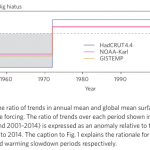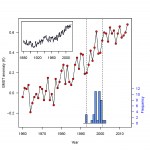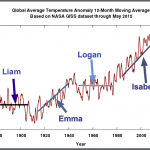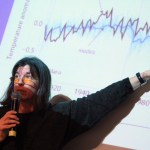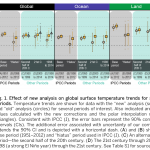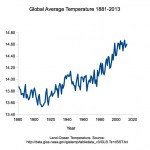Pause
A new paper (commentary) on the so-called "pause in global warming" puts it all together.
First let's establish this as a starting point. When climate science contrarians refer to a "pause" or "hiatus" in global warming, they usually mean that the process of warming of the Earth's surface caused by the human release of greenhouse gas is not a thing. They are usually implying, or overtly claiming, that the link between CO2 and other greenhouse gas pollutants and surface warming was never there to begin with, and previous warming, warming before "the pause," was natural variation. Many even…
You've heard much about the so-called "pause" or "hiatus" in global warming.
One of the implications of a multi-year "pause" in global warming is that the science of global warming must be somehow wrong, because with CO2 rising in atmosphere, due to human activity, how can the surface not warm? However, surface temperatures have been rising, but at a somewhat slower rate than at some other times.
The truth is that there is a lot of variation in that upward trending surface temperature value, measured as an anomaly above expected temperatures. Sometimes the variation pushes the rate of…
We drove north for two days, to arrive at a place that existed almost entirely for one reason: To facilitate the capture and, often, consumption of wild fish. The folks who run the facility make a living providing shelter, food, boats, fishing tackle, easy access to a fishing license, and they can be hired as guides. The whole point is to locate, capture, butcher, cook, and eat the fish. The fish themselves have little say in the matter.
And while talking to the people there we got a lot of advice as to how to find and capture the fish, and offers were made to assist with the butchering and…
There are two new scientific research papers looking at variation over the last century or so in global warming. One paper looks at the march of annual estimates of global surface temperature (air over the land plus sea surface, not ocean), and applies a well established statistical technique to ask the question: Was there a pause in global warming some time over the last couple of decades, as claimed by some?
The answer is, no, there wasn’t.
The paper is open access, is very clearly written so it speaks for itself, and is available here. One of the authors has a blog post here, in German…
There is no such thing as a "pause" or "hiatus" in global warming.
There is, however, variation as the earth's surface temperature steadily rises as the result of the human release of greenhouse gas pollution. Every now and then that variation results in a period of several years when the rise in global temperature is relatively slow, and a recent such period has been termed a "hiatus" or "pause." But that signifier mainly comes from those who deny the reality of global warming, and is often used by them as an argument that global warming is somehow not real. It is real, and they are wrong…
The Earth's climate is warming. The upper oceans are warming, the sea surface temperatures are elevated, the air in the lower Troposphere, where we live, is warming. This warming is caused almost entirely by the increase in human generated greenhouse gasses and the positive (not positive in a good way) feedbacks caused by that. The effects that increase the global heat imbalance and the effects that decrease it (such as greenhouse gas increase and aerosols -- dust -- from volcanoes, respectively) vary over time in their effect, which causes some variation in the upward march of global…
First, there is no hiatus. Climate science skeptics claim that warming stopped in 1998. It didn't. Stefan Rahmstorf has a nice post placing 2013 in context with the most recent data, HERE. Just click the "translate" button to read it in your favorite language.
UPDATE: Stefan's post is now HERE on Real Climate, in English.
Stefan has a bunch of great graphics that you will enjoy. Following his lead I've decided to make a graphic or two myself.
First, the data. NASA has this data to which people often refer when discussing global warming. I took that database and fixed it up a bit. I…
